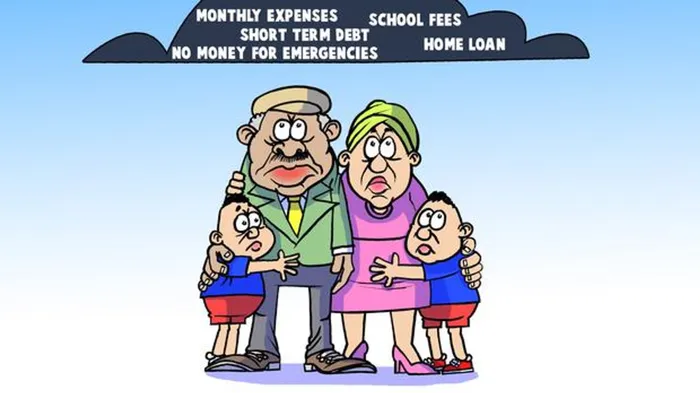Almost half of middle class in 'junk status'

If your credit ratings were measured with the same yardstick that credit ratings agencies use to analyse a country’s financial health, would your rating be “junk”?
In simple terms, if you cannot meet your financial obligations every month, your financial status might well be “junk”.
According to Businessdictionary.com, a credit rating means: “A grading of a country’s ability to meet its financial obligations. Credit-rating agencies provide these ratings, and investors use them to assess the level of risk related to investing in a country.”
According to the 2017 Sanlam Benchmark Survey, some findings of which were released this week, nearly half of the country’s middle class is in junk status.
The results of the survey were based on a sample of 1 317 individuals, 60% of whom earn more than R300 000 a year.
Forty-two percent of respondents said they cannot meet their debt obligations timeously.
When asked if they were financially stressed, a massive 72.77% of respondents said they experience financial stress.
According to the survey, the key triggers of financial stress were:
• Short-term debt obligations, such as car payments, credit cards and personal loans – 54.7% of respondents identified this as the source of their financial stress;
• School and university fees – 30.77% of respondents;
• The “black tax” (the obligation to assist your family financially) – 32% of respondents; and
• Long-term debt obligations, such as home loans – 23.57% of respondents.
The survey also found that:
• 1 out of 9 respondents said they were not coping with their financial stress;
• 1 out of 3 said they coped with debt by reducing expenditure;
• 1 out of 5 said they have to borrow from friends and family to makes ends meet;
• 7 out of 10 believed they would have to reduce their standard of living when they retired; and
• 3 out of 5 were not making provision to be able to pay their medical scheme contributions in retirement.
Viresh Maharaj, the chief executive of client solutions at Sanlam Employee Benefits, said the research shows that financial stress lowers the quality of our lives and makes us less productive at work.
“This is our middle class – the spine of our economy, our tax base, and our hope for the future. And they are stressed. We believe that the findings point to a dire need for financial coaching and increased employer involvement in the financial wellness of employees,” Maharaj said,
He said the National Credit Act has done little to prevent people from buying things they could not afford. “The fact is that it is much easier to get a R10 000 loan than to get the same amount to invest,” he said.
When it comes to financial advice, the survey found that 34.67% of respondents said they turn to Google to find answers to their money problems, while 40% said they approach family, friends or colleagues. Fifty-two percent said they have a personal adviser or broker.
Trurman Zuma, the chief executive of Sanlam Personal Finance: Savings, said that to get out of a financial mess, you first have to understand the spending behaviour that led you into the situation in the first place, and then you have to seek help.
“Help means turning to advisers who are able to work with the middle class to educate and coach them towards consistently displaying the right behaviours and making better decisions. In fact, just over 80% of the respondents indicated that they do value financial advice.
“Good-quality advice can have a material impact on financial stress, but access to and the affordability of quality advice may act as barriers to many respondents, as only 52% of respondents have advisers.”
Maharaj said employers have a key role to play in putting employees on the right track financially, which can help employees to become more productive.
“Access to and the affordability of quality advice are issues across the middle class and more so for blue-collar workers, but this can be addressed via the mechanism of the employer. Workplace-based financial wellness programmes provide the opportunity for employers to address the drivers of their employees’ financial stress.”